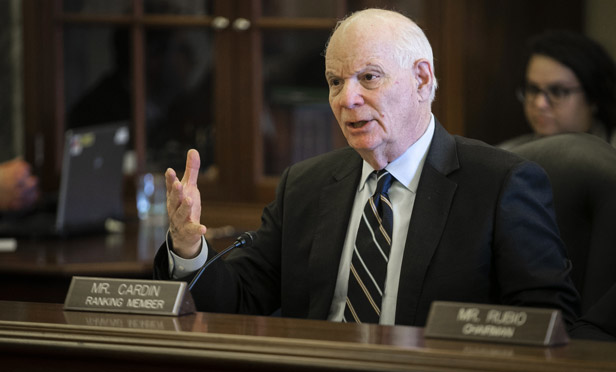 Sen. Ben Cardin, D-Md. (Photo: AlDrago/Bloomberg)
Sen. Ben Cardin, D-Md. (Photo: AlDrago/Bloomberg)
Sens. Ben Cardin, D-Md., and Rob Portman, R-Ohio, reintroducedlegislation late Monday that would raise the required minimumdistribution age from 70 ½ to 75 and also help workers pay offtheir student loans.
|Cardin and Portman's Retirement Security and Savings Act of 2019overlaps with some provisions in the Retirement Enhancement andSavings Act (RESA) of 2019, which was introduced on April 1, butRESA only raised the RMD age to 72.
|The RESA bill, introduced by Senate Finance Committee ChairmanChuck Grassley, R-Iowa, and ranking member Ron Wyden, D-Ore., issimilar to H.R. 1994, the Setting Every Community Up for RetirementEnhancement (SECURE) Act of 2019, which is expected to get a voteon the House floor before Memorial Day weekend.
|“Passage of RESA remains a top priority for Sen. Wyden and me,”Grassley said Tuesday, adding that he hopes the House “will sendits version of RESA over to us this month.”
|The Senate Finance Committee held a hearing Tuesday morning toexplore the challenges in the retirement system.
|Cardin stated during the Tuesday morning hearingthat “the first priority is to get the RESA bill acrossthe finish line as soon as possible.”
|Rep. John Yarmuth, chairman of the House Budget Committee, hasscheduled a hearing for Wednesday on ways toimprove retirement security in America.
|The Portman-Cardin bill phases in the RMD age increase overseveral years and would update mortality tables to reflect longerlife expectancies.
|The bill would also expand the ability of employer-sponsored403(b) plans to offer collective investment trusts (CITs), a mutualfund-like vehicle used in some 401(k)s and pension plans that canhelp plan sponsors cut costs.
|The Insured Retirement Institute, a lobbying group for theannuity industry, supports the bill. “Section 117 [of the bill]would level the playing field by providing insurance products withthe same exemptions as CITs,” the group said in a letter tosenators, sparking “a robust and competitive marketplace which isvital to ensure Americans have access to the appropriate savingsoption for their financial situation.”
|The Portman-Cardin Retirement Security and Savings Act wouldalso enable workers to make student loan payments while receivingemployer-matching contributions into their retirement account “asif the student loan payments were salary contributions.”
|The bill would also:
- Allow participants with Roth accounts in 457(b), 401(k),401(a), and 403(b) plans to roll Roth IRA assets into theseplans.
- Permit 457(b), 401(a), 401(k) and 403(b) plan participants tomake qualifying charitable distributions, which under current laware only allowed from IRAs.
Student Loan Repayment Bill
Senate Finance Committee ranking member Wyden and fourcolleagues reintroduced similar legislation, the Retirement Parity for Student LoansAct, the same day.
|Under current law, employers may only make matchingcontributions to a 401(k) retirement plan if employees are alsomaking contributions.
|The Retirement Parity for Student Loans Act —co-sponsored by by Sens. Maria Cantwell, D-Wash.; Cardin; SheldonWhitehouse, D-R.I.; Maggie Hassan, D-N.H.; and Sherrod Brown,D-Ohio — would allow employers to make matching contributions to aretirement plan while their employees make student loanrepayments.
|For example, if an employee's student loan payment is $500 andhis or her employer matches 50% of retirement plan contributions,the employer would contribute $250 to the employee's retirementaccount.
|“Millions of college grads are buried under tens of thousands ofdollars in student loan debt that prevents them from building theirfuture — buying a home, saving for retirement and starting afamily. The sooner workers start to save for retirement the better,and paying down student loans shouldn't stop them from buildingtheir nest egg,” Wyden said. “While acomprehensive response to the student loan debt crisis is needed,this policy change is an important piece of the puzzle.”
Complete your profile to continue reading and get FREE access to CUTimes.com, part of your ALM digital membership.
Your access to unlimited CUTimes.com content isn’t changing.
Once you are an ALM digital member, you’ll receive:
- Critical CUTimes.com information including comprehensive product and service provider listings via the Marketplace Directory, CU Careers, resources from industry leaders, webcasts, and breaking news, analysis and more with our informative Newsletters.
- Exclusive discounts on ALM and CU Times events.
- Access to other award-winning ALM websites including Law.com and GlobeSt.com.
Already have an account? Sign In
© 2024 ALM Global, LLC, All Rights Reserved. Request academic re-use from www.copyright.com. All other uses, submit a request to [email protected]. For more information visit Asset & Logo Licensing.









